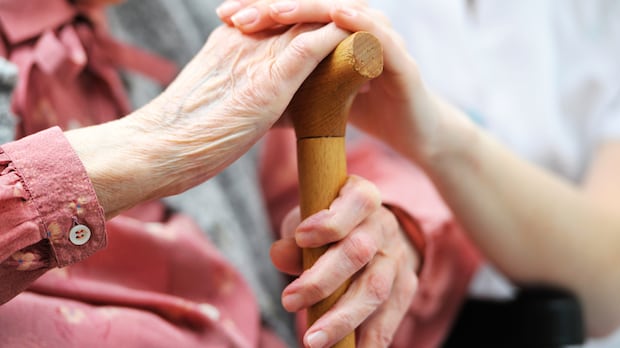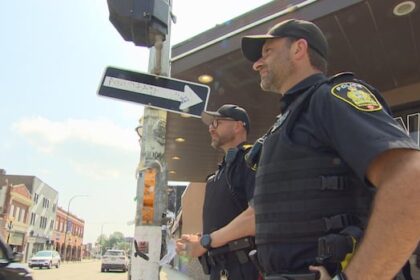British ColumbiaFamily violence against seniors in Canada has reached a record high, according to a new Statistics Canada report. The rate of family violence against seniors nationwide has increased by 49 per cent since 2018. Senior victims of family violence most often victimized by their childLauren Vanderdeen · CBC News · Posted: Nov 04, 2025 8:00 AM EST | Last Updated: 7 hours agoListen to this articleEstimated 4 minutesPolice-reported data about family violence towards seniors does not capture all of the incidents of abuse that occur, according to Alexandra Lysova, a criminology professor at Simon Fraser University in Burnaby, B.C. (Alexander Raths / Shutterstock)Family violence against seniors in Canada has reached a record high, according to a new Statistics Canada report.The rate of family violence against seniors nationwide has increased by 49 per cent since 2018, according to the StatsCan report.Last year, senior victims of family violence were most often victimized by their child, while around one in four was victimized by a spouse or another family member.There were 7,622 senior victims of police-reported family violence in 2024, nationwide.WATCH | Violence against seniors is on the rise:Family violence against seniors reaches record high in Canada: StatsCan reportFamily violence against seniors has reached a record high in Canada, according to a new national report. And experts in B.C. say the severity of abuse against the elderly is also getting worse. CBC’s Janella Hamilton looks into why.Alexandra Lysova, a criminology professor at Simon Fraser University in Burnaby, B.C., said the increase in elder abuse is concerning, though she noted the overall prevalence of victimization among seniors is lower compared to other age categories.But while seniors may be less likely to be abused in family relationships than younger family members, she said the issue of elder abuse should be taken seriously as the overall population of people over 65 grows.Serious risk factors for older adults include cognitive decline and physical frailty, she said.“The people who experience many other health-related issues are more likely to be victimized by family members.” Alexandra Lysova, a professor at Simon Fraser University’s criminology school, is seen in her office in Burnaby, B.C., on Nov. 2, 2025. (Janella Hamilton/CBC)Lysova said the reasons for elder abuse include, in part, higher costs of living and housing affordability that may prevent adult children from moving out of their parents’ home.“Economic issues, stress, this intergenerational dynamic of communication, they all may explain the vulnerability of the seniors in Canada,” she said.Lysova noted that police-reported data does not capture all of the incidents of abuse that occur.“What we’re looking at is the tip of the iceberg,” she said, as many people don’t report if they don’t think an issue is serious enough or feel shame for experiencing it.“And again, we’re talking about family members, they don’t want to expose other family members as potential perpetrators.”She noted the way police record data around senior violence has also changed since 2018, which may contribute to the increase.Lysova hopes StatsCan will conduct future reports with a specific emphasis on violence against seniors including information around the context of the incidents.B.C. hotline sees increaseIn B.C., the Seniors First B.C. hotline for seniors abuse has seen an 85 per cent increase in calls regarding physical abuse since 2019 (from 145 calls to 268), according to executive director and staff lawyer Marie-Noël Campbell.Calls for financial abuse rose by 43 per cent to 1,410 calls, and for emotional or psychological abuse by 24 per cent, to 1,420 calls.Campbell said the new StatsCan report is concerning but not surprising.”We see that [month-after-month] that physical assault and violence against older adults has been increasing since pre-COVID,” Campbell said, adding violence can include rough-handling or grabbing people strongly.”I’ve heard some pretty shocking accounts of children mentioning that they wanted to kill their parents,” she said.In 2020, the hotline received about 5,300 calls, while this year it is on track for nearly 8,000, Campbell said.Watch for signs: advocateB.C. seniors advocate Dan Levitt acknowledged elder abuse is on the rise.“One of the things that we’re facing in our society is ageism,” Levitt said. “And the idea that a senior may not be as valuable to a society as other people are.”B.C. seniors advocate Dan Levitt says ageism is a societal issue that can affect how elder abuse is perceived. (Mike McArthur/CBC)He said seniors often don’t want to talk about abuse, so loved ones should look out for lifestyle changes. This can include a change in diet, cash flow, power of attorney, or if a senior becomes more reclusive.“When we see a change in behaviour, that’s when we should be talking to a senior and really shining a light on the possibility that they could be victims of elder abuse.”ABOUT THE AUTHORLauren Vanderdeen is a web writer for CBC British Columbia. She formerly worked for community newspapers, including the Burnaby Now and New West Record. You can reach her at lauren.vanderdeen@cbc.ca.With files from Janella Hamilton
Family violence against seniors reaches record high in Canada: StatsCan











